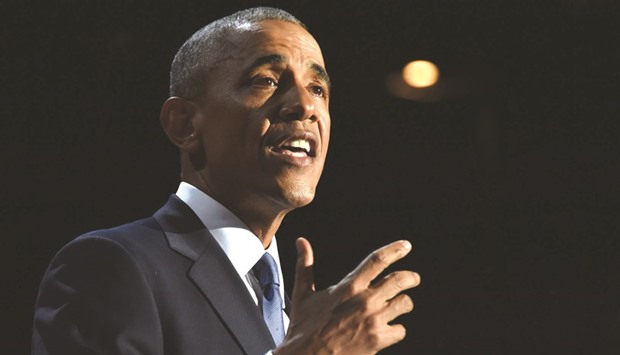Nearly 10 years ago, Barack Obama sat down with a group of Des Moines Register writers and editors to pitch his credentials for the Democratic nomination for president. It was June 18, 2007, and Obama was a first-term US senator from Illinois. His demeanour was youthful, and his closely cropped hair was black, both underscoring his relative lack of experience. But it was another prominent feature he mocked in himself when introduced to Register cartoonist Brian Duffy: His ears. “Oh no,” he said, shaking his head in jest. “Ohhhh no.”
It was an endearing moment, one of many I’ve experienced over the 25 years I’ve been attending Register endorsement interviews. George W Bush showed the same quality eight years earlier, “instantly disarm(ing) a bunch of old sceptics,” as I wrote. “He was funny and familiar, a man who didn’t take himself too seriously, was confident enough to be self-deprecating and to respond good-naturedly to challenges.”
That day, Obama emphasised that he’d bring good judgment to the table and avoid miscues like Bush’s invasion of Iraq. He framed a vision of an America of equal opportunity and upward mobility, respected for its values and ideals, not just its military might. He emphasised how much he was like most Americans; he and his wife Michelle had not long ago repaid their student loans, and she still shopped at Target.
He made decisions, he said, after surrounding himself with bright minds on all sides of an issue and hearing them all before taking action.
Questioned on a memo his campaign had slipped to reporters criticising rival Hillary Clinton the support she had garnered from an Indian-American businessman – it called her “the senator from Punjab,” attempting to link her to the outsourcing of jobs to India – Obama called the memo “stupid and caustic.” He said it didn’t reflect his views. But he became reflective about negative campaigning. “I’m not so naive as to believe I can win without being rough and tumble,” he said. But he also said it was his job to make sure the campaign built the sort of culture he would want in the White House.
Reading back over my notes from that interview, I’m struck both by all he got done and by how much we took for granted in those days about how a White House culture should be. On healthcare, for example, Obama spoke of the need for reforms in which “insurers and drug companies should have a seat at the table but not be able to buy a chair.”
Despite a rocky roll out, the Affordable Care Act is law, helping ensure no one can be turned down over a pre-existing condition. But an incoming president and a Republican-controlled Congress are fixing to get rid of it, threatening to strip 18mn people of their insurance within a year, increase the number of the uninsured by 32mn in 10 years, and cause premiums to double, according to the Congressional Budget Office.
His record on immigration has been less successful. Back then, he advocated a pathway to citizenship for 12mn undocumented immigrants, noting, “I’m not particularly impressed with raids on plants that grab a handful of undocumented workers and send them home.” A mere four months after Obama’s swearing in, Postville, Iowa, was rocked by a massive immigration raid on the Agriprocessors meatpacking plant, leading to the apprehension of 389 workers. The raid cost Postville nearly a fifth of its population. In fact, under Obama, more immigrants were deported than under any previous president.
The Register editorial board endorsed Clinton in the 2008 Iowa caucuses, but I backed Obama, citing his momentum. “It was as if no one could quite believe this youthful but commanding man, who spoke their language and echoed their dreams, might actually run America,” I wrote.
This week, Obama leaves office, eight years older and greyer, his idealism no doubt tempered by the harsher realities of politics. He hadn’t anticipated how vigorously Congressional Republicans would resist him, even openly wishing for him to fail. He didn’t predict how his name and race would be used to undermine him. But whatever his miscalculations, Obama never lost his oratory and ability to inspire, his diplomatic skills or his abiding belief in the power of people to drive needed change.
It’s not hard to see the parallel appeals of Obama and Trump to masses of Americans uncertain about their futures. Both come across as successful, confident leaders who are outside of the political elite and are willing to take bold steps. Bernie Sanders came across that way, too. As for Hillary Clinton, no matter how progressive her platform may have been, she could never surmount the establishment label.
The question now is, for all the intemperate pronouncements, what will we get in a President Trump? How does a people-powered presidency give way to a go-it-alone one, in which no one else is trusted but family, who are elevated to top positions of power. Russian infiltration in elections is tolerated, even invited, and every slight provokes a showdown on Twitter. How much do we really know about his personality? Does he have a sense of humour? Does he show affection to his children and grandchildren? Is he capable of laughing at himself? Who or what inspires him beyond his business dealings? What does he struggle with internally? All I know is that in my 25 years of meeting candidates for the Register, I have never felt I knew less about an incoming president. That has been deliberate on Trump’s part, by categorically shutting the press out.
The pessimist in me says this bodes badly for what’s to come. The optimist says he can only surprise us for the better. The activist says it’s really not about him; it’s about us as citizens demanding the government we deserve.

This week, Obama leaves office, eight years older and greyer, his idealism no doubt tempered by the harsher realities of politics.
